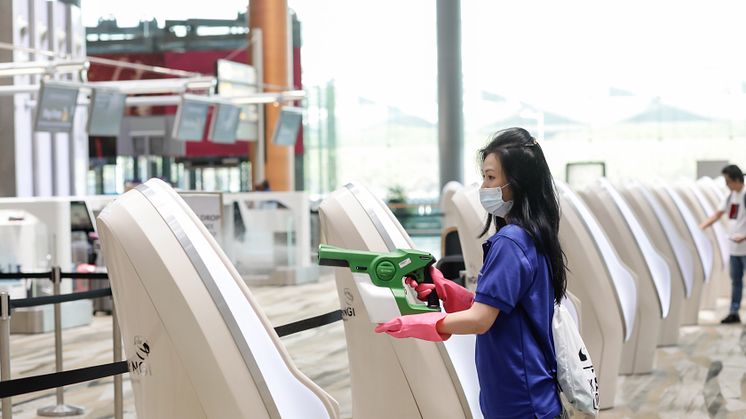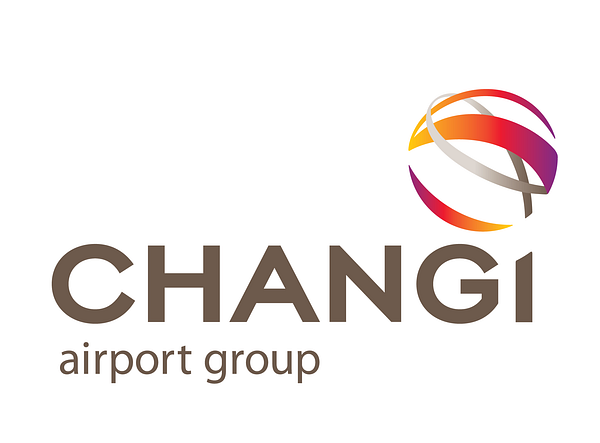
Press release -
Changi Airport Group steps up precautionary measures to keep Changi Airport safe for airport staff, passengers and visitors
SINGAPORE, 13 February 2020 – Changi Airport is an important gateway connecting Singapore to the world, facilitating the movement of people and goods. Hence, it is vital for Changi Airport to remain operational at all times, even with the evolving COVID-19 situation worldwide. To ensure this, Changi Airport Group (CAG) is stepping up measures to safeguard and protect the health of airport workers, passengers and visitors.
Detailed below are the many measures being undertaken by CAG, some of which are new techniques and processes being used for the first time in Changi Airport.
Increase in number of hand sanitisers
- To provide more convenience to everyone, the number of hand sanitisers in the terminals and Jewel has been increased significantly from about 160 previously to more than 1,200. A few hundred of these sanitisers operate on motion sensor, reducing the need for users to touch them.
- Hand sanitisers can be found at the check-in rows, departure and arrival immigration areas, staff entrances, retail and dining outlets, gate holdrooms and many other high-traffic locations. At Jewel, they are available at key touch points such as at the concierge counters and at the entrances and exits of all the Canopy Park attractions.
Increased frequency in cleaning and disinfecting of high contact areas
- As part of the enhanced cleaning initiative at Changi Airport, CAG has at least doubled the frequency of all its cleaning efforts in the four terminals and Jewel. In addition, disinfectants are now used instead of just general purpose cleaning solutions.
- The focus of the extra cleaning and disinfecting is on areas frequently used, including door knobs and handles, touchscreens, handrails (e.g. on travellators, escalators), counter tops, railings at taxi and bus queues, lift buttons, water coolers and play areas. These are cleaned and disinfected more frequently, up to four times a day. Tables at F&B outlets are cleaned and disinfected each time they are cleared.
- In the airport terminals and Jewel, there has been an increase in the frequency of toilet cleaning, the emptying of litter bins and wiping of sinks and counter tops. Disinfectant is used for toilet flush buttons, door knobs, grab bars, toilet paper dispensers and seat sanitiser dispensers.
- Attractions at Jewel’s Canopy Park are cleaned more frequently with disinfectant.
- All cleaning staff are equipped with disposable gloves and masks (when needed) to carry out cleaning and disinfection works.
Coating frequently-touched surfaces with disinfectant
- As an added layer of protection in between cleaning rounds, CAG has started to treat frequently-touched surfaces with a protective disinfectant coating (quaternary ammonium chloride).
- With a single application sprayed onto surfaces, the compound used reduces the chance of viruses and bacteria staying on them. The way the coating is applied allows the surface to be self-disinfecting after each use, reducing the risk of the surface being a medium of transmission.
- Tested and approved by the United States Environmental Protection Agency, the compound is eco-friendly and safe. Each application of the disinfectant lasts for three to six months.
- The surfaces that have been treated with this coating include automated check-in kiosks and automated bag-drop machines, GST refund kiosks, immigration counters, lift buttons, escalator and travellator handrails, information counters and trolley handles. The attractions at Jewel’s Canopy Park, such as the Discovery Slides, have also been similarly coated.
Cleaning with ozone-infused water
- For the first time, ozone-infused water is being used to disinfect toilet floors, toilet bowls and urinals in high-usage toilets.
- Ozone-infused water is a strong cleaner and disinfectant. Compared to chlorine, the most common liquid disinfection chemical, ozone is a much stronger and faster disinfectant in destroying viruses and bacteria.
- Using an ozone-water system, a machine the size of a portable cabin-sized luggage, water is infused with a high concentration of ozone. This water is then used for cleaning floors and flushing the toilet bowls and urinals.
Increased disinfection of floors and cleaning of carpets
- To supplement the efforts of the airport’s cleaners, automation is also used to clean the floors of Changi Airport. A total of 26 automated machines make their rounds scrubbing the hard floors while another two sweep the carpets daily.
- For more thorough cleaning, disinfectant is added to the machines scrubbing the hard floors.
- The carpets in the Departure Transit Hall are thoroughly vacuumed at least three times a week. Disinfectant is also applied after the vacuuming. This is supplemented by daily area vacuuming of high traffic areas.
Temperature screening of passengers and staff
- In addition to existing temperature screening for passengers, airport staff and visitors entering the transit areas of the airport also undergo temperature screening. As well, airport staff are encouraged to take their own temperature twice a day and seek medical attention promptly if they feel unwell.
- Temperature screening is also carried out for guests entering Jewel’s Canopy Park, Changi Experience Studio, Changi Lounge, Shaw Theatres, and YotelAir Singapore Changi Airport.
CAG continues to advise members of the airport community to remain vigilant and observe good personal hygiene, and to take leave from work should they feel unwell.
Categories
About Changi Airport Group
Changi Airport Group (Singapore) Pte Ltd (CAG) (www.changiairportgroup.com) was formed on 16 June 2009 and the corporatisation of Singapore Changi Airport (IATA: SIN, ICAO: WSSS) followed on 1 July 2009. As the company managing Changi Airport, CAG undertakes key functions focusing on airport operations and management, air hub development, commercial activities and airport emergency services. CAG also manages Seletar Airport (IATA: XSP, ICAO: WSSL) and through its subsidiary Changi Airports International, invests in and manages foreign airports.
